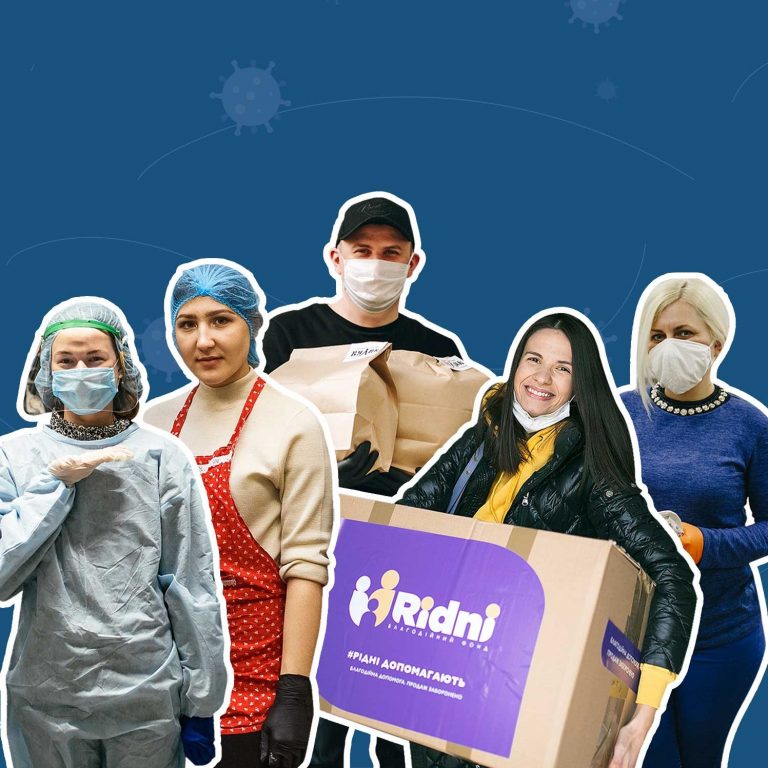Most countries around the world were not prepared for a global pandemic, and it has become a real challenge for the civil society of each country. Government systems were too clumsy to implement the necessary changes quickly.
While the world is talking about Elon Musk’s tweets about the re-profiling of his enterprises for the production of ventilators, in Ukraine hundreds of communities, entrepreneurs, and those who care are launching initiatives to help overcome the pandemic. They raise funds and value any help they can get — whether that’s a few hryvnias or a few million of them. They do what they can and even more — from building protective shields on 3D printers to drawing colour-in cartoons for a charity. They produce their own antiseptics, sew masks, support doctors, deliver groceries to senior citizens, buy PCR tests for the armed forces, and provide psychological support. We have found more than a hundred such initiatives and in this article, we present many of the people working together and working hard to overcome COVID-19.
Manufacturing protective equipment
Fabricator is one of the largest rapid prototyping laboratories in Ukraine. It belongs to a global network — The Fab Foundation. Workers of the laboratory set up their 3D printers to print protective face shields for doctors and launched the “3Dmaski” project. Currently, 90 FDM printers are operating in this lab 24/7 and have already printed more than 30,000 protective shields during the quarantine. The goal is to produce 10 times more. The plastic for printing was purchased by another company, MacPaw (featured later in this article). Fabricator’s technical director Maksym Maksymenko says,
— We tested many different ways of producing shields and came up with the best design. The shield is made of transparent plastic and the frame is printed on a 3D printer. We are concerned about the comfort of our doctors. We value their feedback and are happy to make changes as per their request.
Ukrposhta, a Ukrainian postal service, also joined Fabricator’s initiative and agreed to send parcels to hospitals throughout Ukraine for free. On their website 3dmaski.com.ua, you can make a donation, order a protective shield, or buy one and request for it to be shipped to a specific doctor.
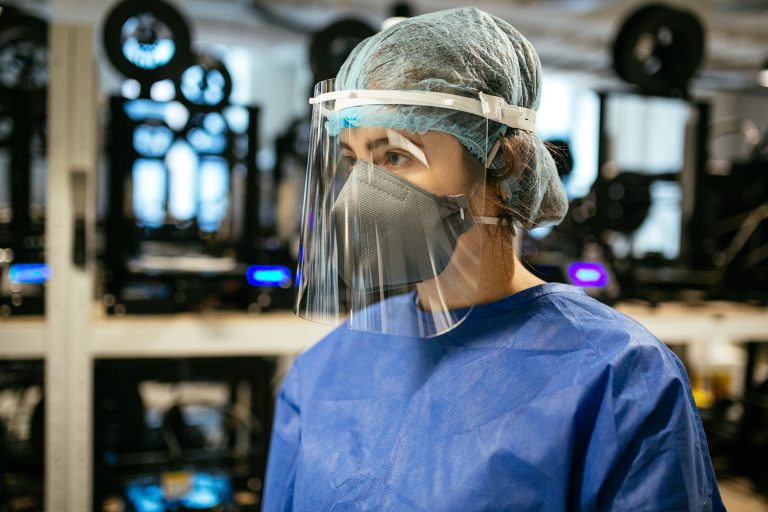
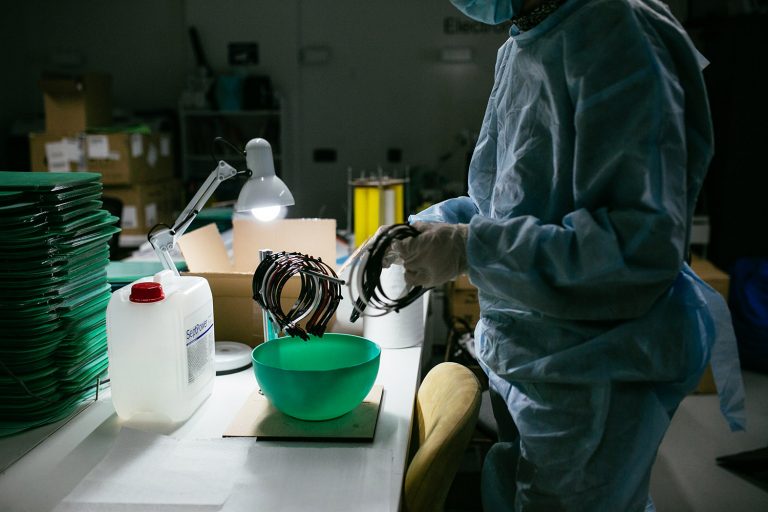
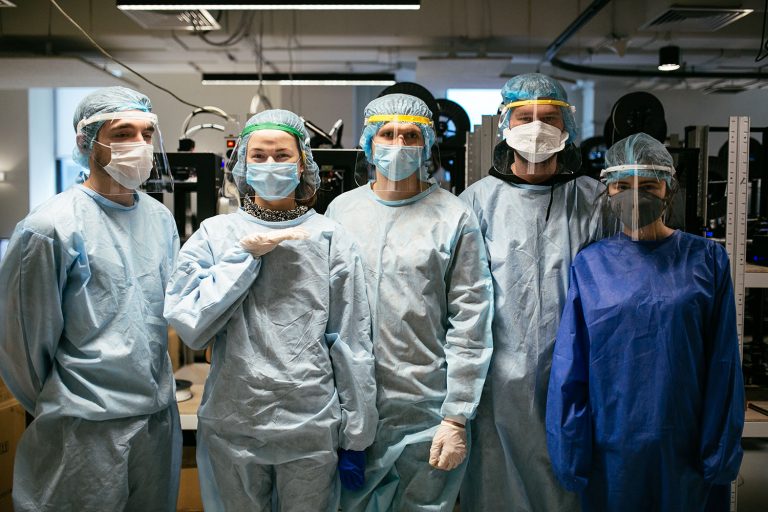
slideshow
Malenkiy garazh (“Tiny garage”) is a children’s toy manufactory in Kharkiv, whose team decided to make fasteners for masks. It turned out they were in great demand. One of the founders of the workshop, Yurek Yackubov says,
— We jumped into action because we realized that in Kharkiv’s seventeen general hospitals there are about 3,500 doctors and medical staff in total, which means that every day seven thousand ears get rubbed into calluses with rubber bands. We tested several models and reached the ideal one. Any plastic that is not too easy to break by hand is suitable for making fasteners — plastic from bottles of shampoos and detergents, office folders, etc. It’s like recycling. It is so great when the ears of our doctors and medical staff can stop suffering while they work!
Fasteners can be made at home as well. The toymakers at Malenkiy garazh have prepared instructions, and they invite parents and children to try it together and join the cause!
Luchesk Satellite Rotary Club Kyiv is a Rotary community from Lutsk that sews reusable masks and provides them for free to anyone who needs them in their region. The organizers say that it all started at one of their club meetings when someone said, “why don’t we sew some protective masks?” The fabric for the first batch was provided by one of the Rotarians while another donated accessories such as bands and fasteners. The seamstresses of the Lutsk Center for Vocational Education volunteered to operate the sewing machines and sat down to work. The first thousand masks were distributed to patients and doctors of the regional hospice, as well as to police officers patrolling Lutsk during the quarantine.
Natalia Pavlikha, a Rotarian and Doctor of Economics, explains :
— We have to help each other, protect and encourage each other. Now more than ever it’s important to fight indifference (which itself is also a sort of crisis in our society), and this quarantine is the best time to do so. The pandemic will end, good will prevail, but we must join forces to accelerate this success.
The Rotary club
Rotary International is an association of clubs located around the world. It is a community of citizens whose goal is to develop their local communities and their countries as a whole. These are non-religious and non-political charities open to all, regardless of nationality or race, religion, or political standing. There are more than 35,000 clubs and 1.2 million members around the world.Activists in the Carpathian village of Kotykivka are making homemade antiseptics and masks. The idea was initiated by the head of the village council, who organized a special Volunteer Headquarters. One of the rooms of the village council, previously used for registering newlyweds, was converted into a mini-laboratory where the process is managed by the village’s land surveyor. The head of the village council, Ivan Verezhak, says,
— There were not enough materials to make the antiseptics, so people started donating and bringing them in from everywhere. Many people call and leave messages, looking for the place to drop off the materials. They even brought them into the shop nearby and labelled them “Alcohol for the village head”.
In recent weeks, the villagers of Kotykivka have made more than 30 litres (almost 8 gallons – ed.) of disinfectant solution. Some of it is poured into dispensers and mounted on the streets. They also deliver these to neighbouring villages and show others how to use them correctly. In addition to this, with the help of the villagers, the village council sews reusable masks. These are distributed and worn as far as Horodenka, the region’s central town.
“Aviatsia Halychyny” is a Ukrainian clothing brand founded by the Lviv “!FEST” enterprise (you can read our story about them here: “Exporting Lviv”). They recently redirected their strengths and began sewing protective masks. Yurko Nazaruk, co-owner of the !FEST enterprise, says,
— The idea to sew masks arose immediately, as soon as the pandemic was announced. With this decision, the company’s management wanted to protect the jobs of its employees and simultaneously meet their needs for protection. At first, our tailors sewed only disposable masks, then reusable ones with pockets for replaceable filters were added. The factory currently produces about 20,000 masks daily. We gathered all our businesses and cooperated with our partners. Thanks to this decision, our people have jobs during the period of mass unemployment. The company is not earning anything now, but we will after the quarantine.
ARIDAN, an advertising and design studio from Kropyvnytskyi, switched up their format to make protective face shields for doctors with the #Броня_для_медика (#Armor_for_doctors) project. A similar initiative was organized by Yuriy Vlasyuk together with his team from Kyiv. Oleksiy Trelevsky, an inventor and entrepreneur from Ivano-Frankivsk and the head of the ARDUINO robotics project has also stepped up to meet the need for protective face shields. Together with his team, he manufactures shields that are already working to protect doctors across Ukraine.
Bevza is a Ukrainian clothing brand that inspired a volunteer movement among Ukrainian fashion designers. These days, in addition to designer dresses Bevza produces protective overalls for infectious disease hospitals. The founder of the brand, Svitlana Bevza, says,
— It was a real challenge. You’d see these stories about how the government is “providing” our doctors with safety gear. Well, that sounds wonderful but the reality for thousands of medics across the country was that these news stories on TV were the last they heard or saw of the crucial safety gear that was promised to them. So instead these have to be supplied by volunteer efforts and businesses that cannot operate as usual during the quarantine.
Within a month, Bevza designers have already sewn almost 7,000 pairs of protective overalls. They distribute the patterns of their products online for free. Their cause is already receiving support from colleagues at other brands — Elenareva and Frolov, who are not only engaged in cutting and sewing but have also developed an additional universal size of protective overalls for men. To speed up the process, several sewing shops have joined them in producing these protective collections. Another well-known Ukrainian clothing brand, The Coat by Katya Silchenko, has started to mass-produce masks, which are also being sent to hospitals. Julia Isay, the designer of the 7/11 Seven Eleven brand, is also sewing masks. Her team has also released a video tutorial on how to sew them all by yourself.
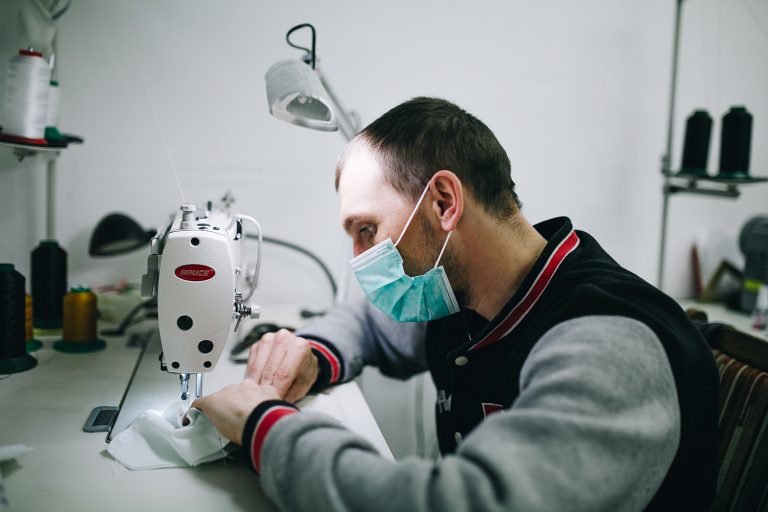
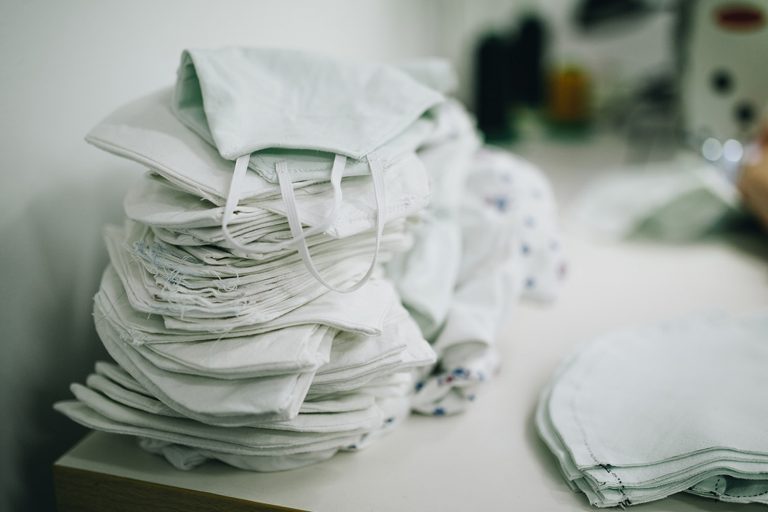
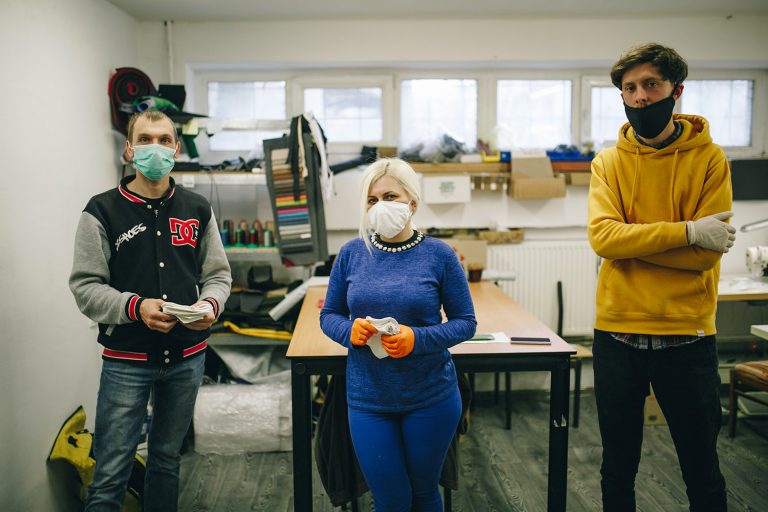
slideshow
HORONDI is a Lviv atelier that sews custom craft backpacks and bags. Under quarantine conditions, they have also begun to sew masks and support the homeless. The team currently directs all their net income from each order to help the Emmaus-Oselya in Lviv (here’s our story about this community) which was in critical condition due to the quarantine. The founder of the brand Sashko Horondi says,
— There is not enough money for food or utilities at Emmaus. About 30 people currently live in the building, but there are still many who live on the streets, alone and face to face with the imminent threat of the virus. Yes, it was a difficult choice to continue our activity during this time. Some might condemn our decision and say that it would be better to stay at home. Right now there are five of our team members working in the studio. We get there on foot or by bike. Unfortunately, there are almost no orders now, the income is minimal. Since the beginning of the quarantine, we have been able to transfer a total of 7,000 UAH (260.00 USD) to the Emmaus community. Plus we provide them with the masks that our guy Bogdan sews. Bogdan, like me, used to live at the Emmaus-Oselya.
You can order a craft backpack and join the charity initiative on the HORONDI Facebook page. Read and watch the story about Sasha Horondi and his backpacks here.
Ostap Lun is an equestrian trainer and the owner of a ranch called “Skarbova Hora” (Treasure Mountain) near Lviv. He also owns a sewing company and has temporarily repurposed his workshops so that his employees can sew microfiber masks. Ostap says,
— In one week, the seamstresses managed to sew 10,000 masks. As it happens, we already sewed them in 2008 during the swine flu pandemic. I did not think we would come back to this, but I believe that everything will be fine. We know how to unite in difficult times, to overcome misunderstandings and to focus on the fact that we are all citizens of one country and its future is in our hands.
Ostap Lun is temporarily closing his sewing business, working instead on his own ranch. Check our article about his story — how he once travelled across America to learn how to build his own ranch.
А team of volunteers in Lviv, led by Anastasiya Rybak, is also busy sewing masks and sanitary shoe covers. Meanwhile in Uman, Lyubov Logvinovska is also engaged in quarantine sewing. Oleksandra Balyasna is the chairwoman of the board of the Association of Parents of Premature Babies “Ranni Ptashky” (“Early Birds”). She also heads the company “Ranenko,” and her team is currently sewing masks for kids. Eva Vitalina is from Pidhorodnyi, not far from the city of Dnipro. Her team of tailors are currently sewing masks for their local firefighters and doctors.
Garage Hub is a studio in Kharkiv that has developed PARP masks (“protective helmets” with full ventilation) ideal for work in infectious disease centres. The helmets are equipped with filters that stop at least 99% of particles, as small as 0.3 microns in size, from passing through. Each helmet also has two sensors: one indicates that the filter is almost clogged or blocked and the second shows when the battery should be charged. Currently, no company or manufacturer in Ukraine produces these kinds of helmets and the price of Western suppliers starts at 1,000 USD per helmet. Meanwhile the total cost of Kharkiv engineers developing this design themselves and manufacturing models is under 2,000 UAH (74.00 USD).
Pavlo and Vasyl Tsapiuk are brothers from Lutsk, who founded the #saveDoctor initiative and set up the production of protective face shields (#faceShield). So far, they have made and donated over 7,000 shields to medical staff in the Volyn region. According to the brothers, doctors say that their products are comfortable, easy to use, and easy to disinfect.
Jhiva Trading House is a clothing brand that, in addition to dresses and shirts, began sewing protective suits during the quarantine. Dva Kolyory (Two Colors) is an embroidery atelier making protective equipment for hospitals in and near the zone of conflict in Eastern Ukraine. Grehori Textile, a textile manufacturer in Lviv, is producing special boot covers and reusable protective suits. Meanwhile in Ivano-Frankivsk, their colleagues at ISWEAR and YES! Kids have started sewing masks and distributing them to doctors in their region. Wildwood also produces masks for doctors and anyone else who needs them. Bilka, an eco-bag atelier, sends its masks to doctors who work in rural areas and villages.
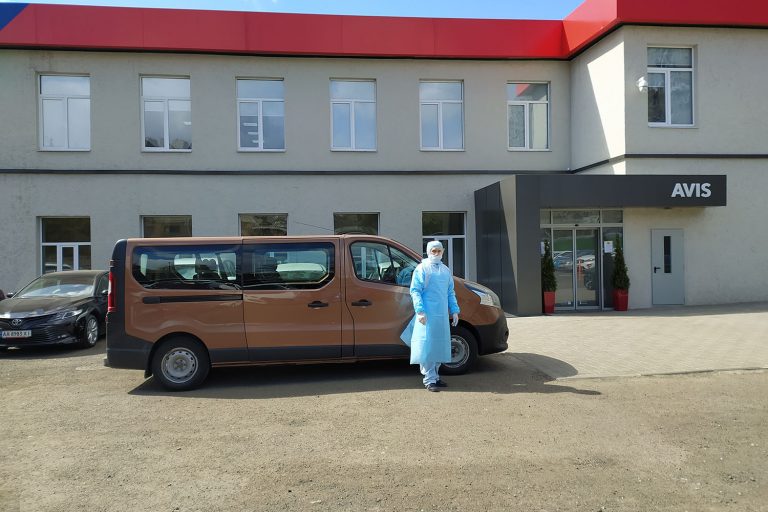
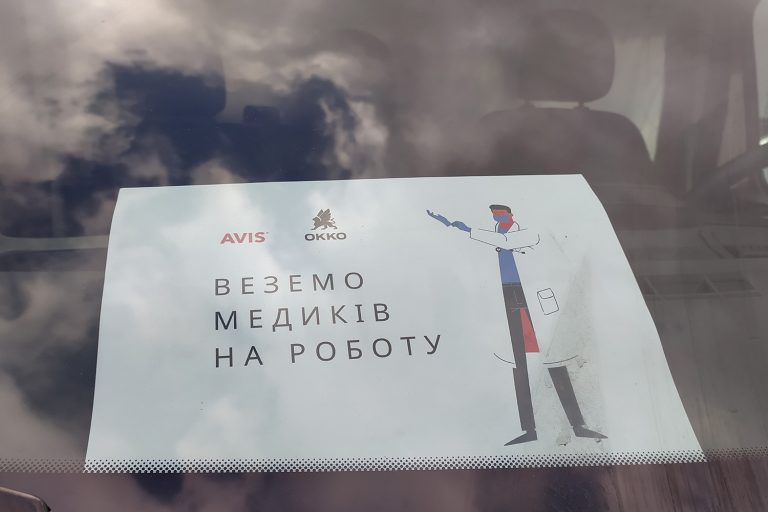
slideshow
Support for doctors and medics
Avis Ukraine is a car rental and leasing company that was one of the first to come to the rescue when city-wide and regional public transport (routes connecting the downtown to rural areas and city outskirts) shut down due to COVID-19. The company provided its “car with a driver” service for free to physicians who live outside Kyiv but work in the city, at Kyiv City Maternity Hospital №6. Every morning, a nine-seater minivan picks up obstetricians and nurses who live 50 km from Kyiv, bringing them to work and then back home after their shifts are done. After each trip, the car interior is thoroughly disinfected and the driver is always in full protective gear. Serhii Shpychka, director at the maternity hospital says,
— Without this help, getting to work was a real problem. Of our 300 employees, 128 live quite far — outside the city in various parts of the Kyiv region, and in neighbouring regions (including Chernihiv, Poltava, Cherkasy). No transport is available there now, and people could hardly get to work. Some of them stayed overnight in the hospital. That is why we are grateful for such care.
Alina, who works as an obstetrician at a women’s clinic and helps young mothers deliver babies, also uses this service. She says:
— It was pleasant for us to notice a tendency that with the beginning of the quarantine the number of women registered pregnancies increased. It shows that quarantine still promotes fertility, people stay at home and do the right thing — they carry on as usual.
MotoHelp is a volunteer-operated rescue organization that takes care of the urgent delivery of donated blood to hospitals in Kyiv and the region. Volunteers even make these deliveries on bikes. The organization also has an emergency response team for road accidents — volunteers immediately head to the scene of the accident, where they provide first aid and legal assistance. This year, Motohelp has signed an agreement with the Kyiv City Center for Medical Emergencies and now it is officially assisting the capital’s paramedic teams. With the start of the quarantine, drivers also support doctors, helping them get to work and delivering protective equipment as needed.
Mykhailyna Skoryk-Shkarivska is a journalist, media trainer and public activist in the city of Irpin, near Kyiv. Since the beginning of the quarantine, she regularly drives doctors into Kyiv to work and urges others to do the same. Along with the Patients of Ukraine Foundation, she also provides physicians in the Kyiv region with protective suits, goggles, and respirators. A similar initiative was put into action by a team of assistants from Vinnytsia, led by military volunteer Tanya Vlasyuk. In addition to transporting doctors, they also sew masks, prepare food and support armed forces on the front.
Another initiative, “Pidvezy medyka Ternopil” (“Drive a doctor to work in Ternopil”) was started by the deputy of the Ternopil City Council, Andriy Shkula. The volunteers say that at a certain point they decided those who had driven 50 or more medical workers should be tested for coronavirus. So they did that, and to everyone’s relief, all the results were negative.
A similar initiative, #підвези_лікаря_Донеччина (drive a doctor to work in the Donetsk region) has an entire community of active citizens and volunteers who were initially brought together by veterans of the war in Eastern Ukraine. Every week, these volunteers travel about 2,000 km to pick up about 2,500 doctors working in hospitals throughout the Donetsk region.
The #таксідлядонора (taxis for donors) project is an all-Ukrainian program launched by the Varto Zhyty (Worth Living) Foundation and the DonorUA Foundation in collaboration with the Uklon online taxi service and the WOG gas station network. This initiative allows all prospective donors to order a free taxi to the Blood Donation Center and back in 26 cities of Ukraine. According to the volunteers, “every day, over 300,000 Ukrainians will need a blood transfusion, and we have no right to lose a single life, even in quarantine conditions.”
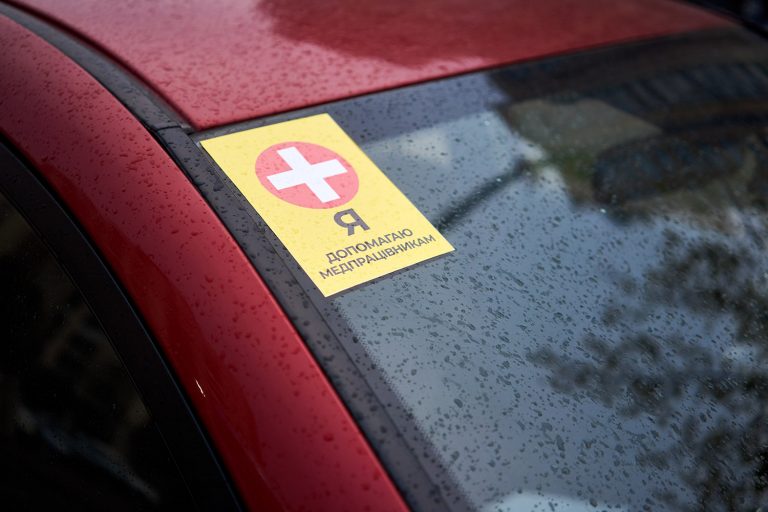
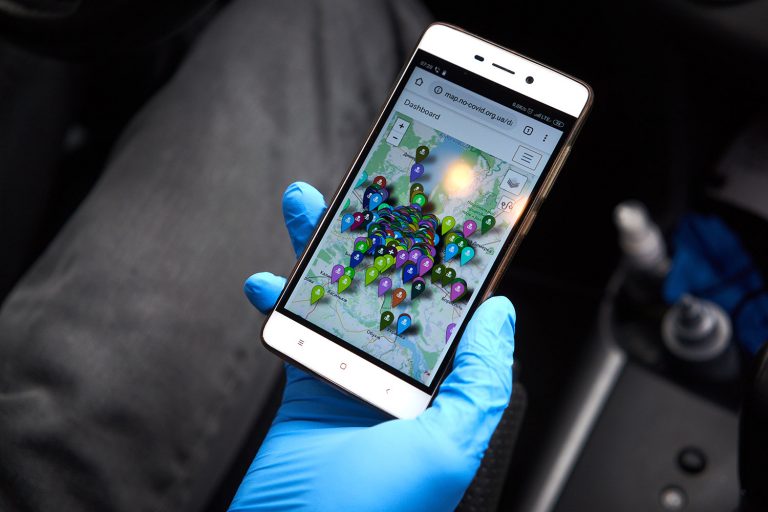
slideshow
#СтраховкаДляМедика (InsuranceForMedics) is a charity project of the Kryvyi Rih community, united in support for the doctors who are risking their lives during this pandemic. Citizens and entrepreneurs in Kryvyi Rih decided to step up and do what the state and local authorities failed to do. The charity project was initiated by the NGO Association of Responsible Citizens (ARC), which negotiated with a dozen private insurance companies for a week. They managed to sign a contract with one that dared to take a risk and provide insurance for all medical staff who are at the forefront of the fight against COVID-19. The co-founder of ARC, Yuliy Morozov, says that the first policies were already received by the employees of Substation No. 1 of the Kryvyi Rih Paramedic division at the end of April.
— We started with the paramedics and doctors at the Infectious Diseases Hospital — those who experience the highest contact with carriers of the virus. In order to cover all the doctors in our area, we need more than 300,000 UAH (11,130.00 USD). We urge all Kryvyi Rih residents, current and former, to join this fundraiser. You can take responsibility for one or more health workers, or for a whole team or substation.
The cost of one policy is 363 UAH (13.50 USD) (taxes included) and covers the doctor for at least the next 3 months. Yuliy indicates that, in case of the need for inpatient treatment from COVID-19, the insurance will cover the costs of drugs and diagnostic tests in the amount of 25,000 UAH (930.00 USD). You can support the initiative by transferring funds to the account of the NGO Association of Responsible Citizens, indicating that it is for the “Insurance for Physicians” project.
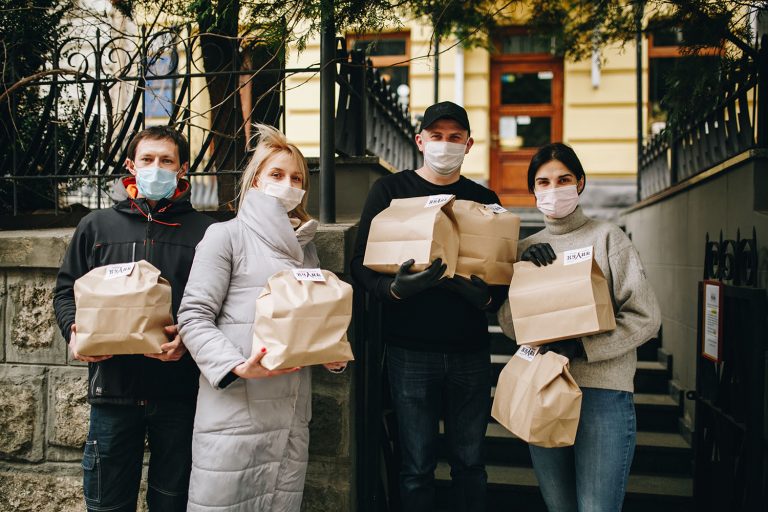
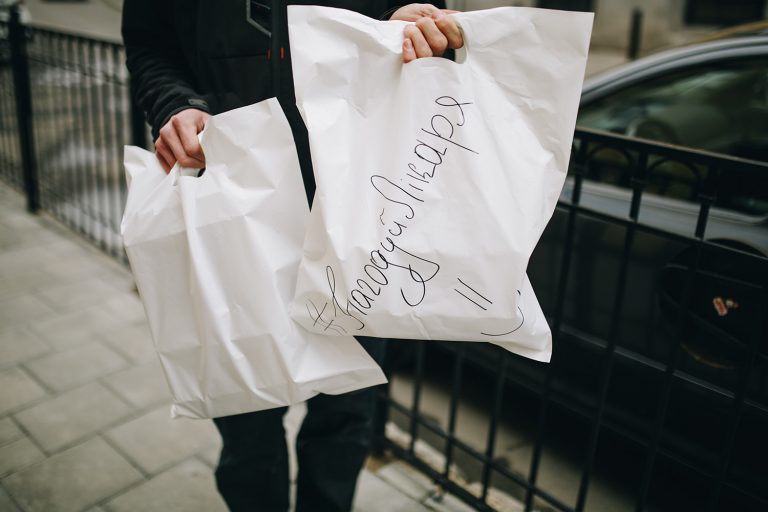
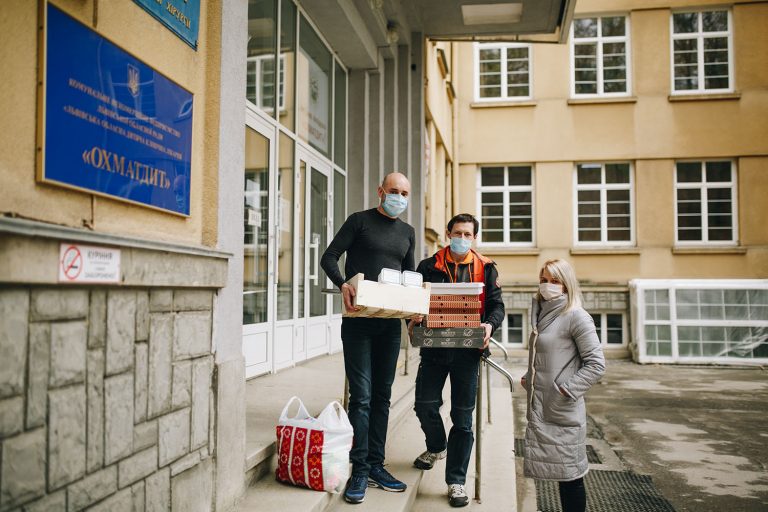
slideshow
Helping the elderly. Food for medical staff and everyone in need
TARILKA (The Plate) is a charity organization in Lviv which created the first food bank in Ukraine. Earlier, its volunteers collected quality unused food from local cafes, restaurants and supermarkets, and gave it to the needy. Now, in collaboration with the Association of Charitable Organizations, they have launched another campaign — “Feed the Doctors”. Two dozen Lviv restaurants agreed to prepare meals which volunteers then deliver to ten hospitals and laboratories in the city and region. Taras, one of the members of the initiative, says,
— Every day this includes more than a hundred hot lunches. Every challenge we face as a society creates new heroes. I think that soon, instead of wanting to be like Superman or Batman, our children will look up to doctors who are sacrificing everything and saving lives today. If we can help our heroes, we have to do everything we can.
You can support a medic or a person in need by making a donation via the TARILKA website.
Velopomich is a volunteer project created by the Kyiv 100 Cycling Community, which helps and supports single senior citizens. The cyclists deliver food and medicine to the homes of elderly men and women. This reduces the number of contacts for this age group, which is especially at risk. A volunteer-cyclist can choose a specific location and help out there. This can be either an apartment block, a house, a residential complex, or even a neighbourhood. Anyone living in the area can join the initiative and become a volunteer-cyclist by filling out this form.
Starenki is a charitable foundation that provides assistance to single senior citizens in Kyiv, Dnipro and Lviv. During the quarantine, the amount of work has significantly increased. Volunteers at the foundation purchase food kits and bring them to those who need to stay at home. A similar initiative was launched by Juice, a children’s charity foundation from Kyiv, which also started helping the elderly. The same is being done in the Kharkiv region by a team of volunteers led by Roman Sobol. They deliver packages of products to the senior citizens in their cities and rural areas. For large families and those in need, another organization — Makitra — has developed a separate initiative. Their relief efforts are organized by Yevgeniya Kravchenko and her community. In Chernivtsi, food and perishables for those in need are collected and distributed by Kateryna Ponomareva’s team. Each package includes a face mask made by volunteers from the local Youth Residence Centre.
Paliturka – Coffee & Books is a Kyiv coffee house that, together with the Ukrainian Red Cross Society, launched the #кавадлямедика (coffee for doctors) initiative. The team puts together packages with coffee, tea and household cleaning products, which volunteers deliver to ambulance stations and Infectious Disease Centres of the capital. Semen, one of the Paliturka founders, says:
— Medical staff are currently working in an intense environment and deserve a break with a nice coffee. We are a small business just surviving these days but we, like every other business, have products that can make the work of medical staff a little easier. We have coffee, tea, sweets, milk, napkins and paper towels, liquid soap and disinfectants. Why not share what you have? It’s great when socially responsible business and the public sector join forces. Together we can do more!
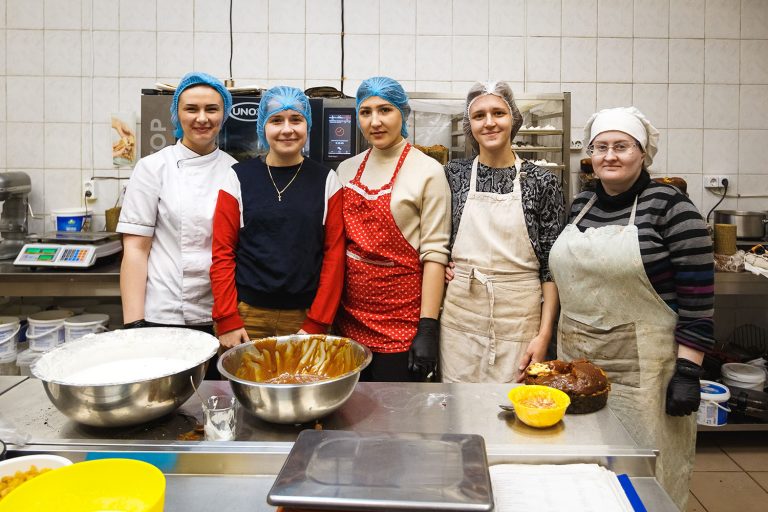
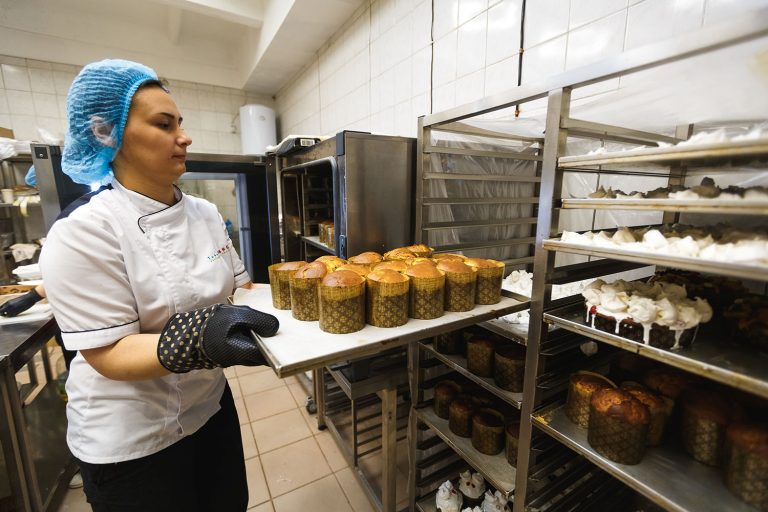
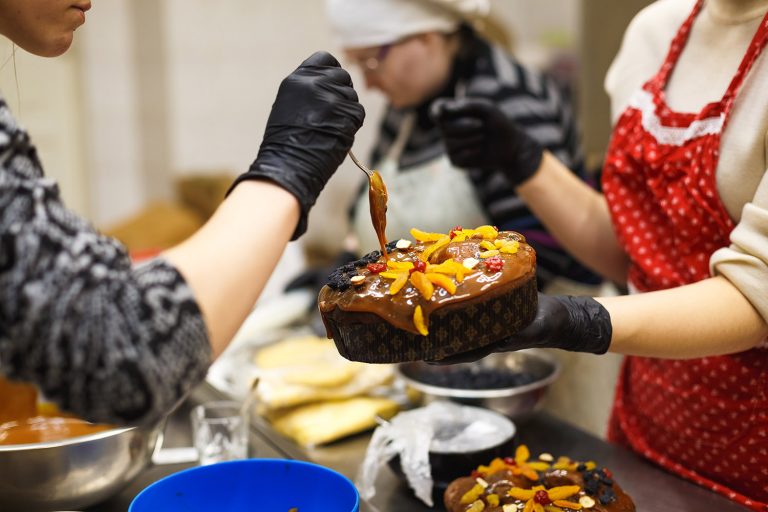
slideshow
March & Co Bakery is a small confectionery in Kyiv that has been baking “anti-crisis” cakes since the beginning of the quarantine. These are nicknamed # карантинкейки (quarantine cakes) and decorated with current WHO tips such as “Wash your hands”, “Stay at home”, and “Don’t touch your face”. Before Easter, the bakery team launched the #добропаска (kind Easter) campaign. For each purchased paska (traditional Ukrainian Easter bread), the confectioners baked another one. This made for a total of 460 of them, half of which were donated to the Starenki Charitable Foundation for the elderly. Sofia Terebova, the founder of the bakery, says:
— We wanted to continue the chain of care, which was launched by our customers, who have been supporting our confectionery through the quarantine. It’s incredibly inspiring for us! So for each paska our customers ordered, we baked another one for the elderly folks out there. So that this Easter, despite the isolation, everyone could feel a sense of care and a festive atmosphere.
Hanna Ginda is a photographer and marketer from Kyiv who helps out the homeless along with her friends. They usually prepare food three times a week, pack it and distribute it to the needy. Hanna says:
— We manage to feed about 50 people at once. In addition to food, we also give them warm clothing and disinfectants. In times like these, if a person has the ability to help — whether that’s a physical, emotional or financial resource, then it is time to use it for good deeds. If you think it’s difficult to join an initiative, it really is not, you should just contact the volunteers out there, the way I’ve done recently.
Another team of assistants in Kyiv is headed by Olga Kiryanovska. During the first week of May, they distributed about 2,000 servings of food to the homeless. In addition to distributing hot lunches, they also helped them with medicine, shoes, hygiene products, temporary housing and the renewal of personal documents.
In Chernivtsi, staff at the “Cleo” restaurant are hard at work. Apart from preparing regular orders for pickup, they are also preparing free meals for the elderly and for medical workers. They do it quietly, without any publicity. The restaurant also purchased about a thousand masks and 30 litres of alcohol-based disinfectant. Halyna Petrenko, the director of the restaurant, says,
— We transferred a portion of the masks and disinfectant to local hospitals, while the rest was distributed to citizens on the street. These are not a large amount of help, and of course, I would like to do more. Currently, the elderly folk we provide with meals are those who live nearby, in our neighbourhood. The doctors we assist never ask for anything, we just bring what we can. They thank us every time, they say it’s delicious. It is the best reward for our work.
The St. Egidius Community is an international volunteer organization that helps primarily the elderly, the homeless, the sick and people with disabilities. Since the beginning of the quarantine, they have focused on Kyiv’s homeless, organized the distribution of free lunches, distributed masks, antiseptics and antibacterial wipes. Oleksii, a volunteer at the organization, says,
— Everything is different now, and our food distribution looks different: we do it in small groups, keeping distance between people. Because of this new format, we need more volunteers. More products are also necessary, as some charity kitchens in Kyiv are currently closed. However, we continue to work and we remember that quarantine separates us physically, but solidarity unites us and makes us stronger despite that.

Фото надане фондом «Повернись Живим».
Assistance and support for the armed forces at the front lines and the families of those who have lost their lives to the war
Come Home Alive is a charitable foundation that helps out on the front lines of the war in Eastern Ukraine and assists specific units in Donbas. With the funds raised, volunteers purchase the necessary equipment and repair military vehicles. Over the past six years, the foundation has raised nearly 200 million UAH (7,420,180.00 USD) for the army. With the onset of the pandemic, it has also begun to provide medical assistance. This includes organizing COVID-19 tests for military personnel, especially those who are always in contact with others. Since the beginning of the quarantine, the foundation has delivered about 1,000 PCR tests to the front line, which volunteers have delivered to military units. Currently, this is the largest testing effort on the front lines.
Tatiana Kim is a fashion designer from Kryvyi Rih. With the help of her team, she sews masks for Ukrainian soldiers deployed in Donbas and their families. At first, they sewed from whichever fabric was available. Tatiana says,
— The first batch went to acquaintances and friends who refused to accept them for free. With the money raised, we bought new material, and the process went faster. Donors also joined our initiative, which allowed us to sew several sets for families with children with autism and children with Down syndrome. We are currently sewing a few more hundreds of masks, which will go to the medical brigades on the front lines, the Donbas Ukraine battalion, and the 74th brigade.
A similar initiative has been put into action by volunteers of the public organization TAPS-Ukraine, from Dnipro. They sew reusable cotton masks, pack them along with antiseptics into essential kits, and send them to the families of fallen soldiers.
Eugenia Eider comes from a family of blacksmiths. She sews various creatively-designed masks and sends them to the front lines in Donbas.

IT initiatives
IT Bro is a team of Ukrainian veterans who, after returning to civilian life, found their new vocation in programming. They currently offer web support to volunteer organizations that are helping physicians fight COVID-19. Oleksa Koba, a veteran and one of the founders of IT Bro says,
— The guys have already developed a platform for the Poltava volunteer group, which monitors the needs of local hospitals. We are offering to launch similar platforms in other regions to connect volunteers and businesses working towards a common cause. So feel free to contact us. We are ready to offer tech support for free. If you do not have the opportunity to find a host site and buy a domain for your initiatives, we are also ready to provide them to you.
If you have a charitable initiative that supports Ukrainian medical staff facing COVID-19 can submit a request for free development of your site here.
A similar initiative is being developed by Yurii Andrusiak, who has created PANDEMIA, a platform to help doctors fight coronavirus. There they can publish their most pressing needs, so that volunteers and donors can respond, raising funds and delivering the necessary items to hospitals.
Ivan Shulba, director of one of Lviv’s IT schools, launched the #свідомі_в_масках (conscious citizens in masks) initiative. Along with his team, he helps doctors with logistics and coordination as well as fundraising, procurement and production of scarce equipment. In addition, volunteers conduct online events that assist with fundraising.
Andrew Pryhodchenko developed Kometa, a site to help medics who have been left without public transport and are unable to spend money on a taxi every day to get to work. On Kometa you can easily find nearby medical staff as a driver or request to be picked up if you are a medic. Andrew says:
— We do not take money from passengers, all we ask is for them to wear a mask, bring ID, and have a temperature of 36.6. During the first three weeks of the service being offered, the site was visited by about 18,000 users, both drivers, and doctors. I do not know the exact number of rides that have occurred, but 2,500 ride requests have been marked by doctors as completed. I have personally picked up a total of only 7 or 8 medical professionals during this time, but some drivers manage to make multiple trips per day.
Another platform with the same concept, no-covid.org.ua, was founded by Andrii Pavlov from Kyiv within the framework of the #підвезилікаря (drive a doctor) initiative. According to Andrii, several drivers joined the movement. The team set up logistics and organized both permanent and temporary routes so that dozens of doctors working in Kyiv could arrive at work on time and return home.
— Despite special public transport passes issued during the pandemic, on a good day many medical workers need 2-3 hours to get to work in Kyiv, often with several transfers along the way. Many of them either live outside the city or have to cross the river via bus or metro. We could not even imagine how difficult it is for them to be at work on time once so much public transport is shut down. There are people who need to leave their house at 4 am to be on duty all the way until 9 pm.
The Lviv IT Cluster has launched a project of mass COVID-19 testing in Lviv and the region. Rapid tests check primary risk groups: those who have returned from abroad or have been in contact with patients, doctors and medical staff, as well as those who actually have symptoms. During the project, more than 30,000 people were tested in Lviv and the region, and 154 people were suspected cases, so they will be further checked by PCR tests. IT Cluster is also making financial donations to the insurance fund which provides a one-time payment to infected doctors working in the region. You can join the initiative or make a donation on this page.
Joining the effort to overcome COVID-19, N-iX, an IT company, created a special charity fund and initiated a mass purchase of rapid tests. Currently, 50% of the fund is supported by the company and 50% by its employees. The organizers plan to consolidate the first 2 million UAH (74,200.00 USD) for the purchase of 10,000 test systems for hospitals throughout Ukraine.
Their colleagues from Kharkiv IT Cluster launched the IT4Life initiative in the region, thanks to which they managed to collect and purchase equipment worth more than 3 million UAH (111,300.00 USD), including concentrators and cardiographs. The company is also building oxygen channels in hospitals, increasing the number of beds in intensive care units with access to it. According to doctors it prevents complications of COVID-19, promotes rapid recovery of patients, and even decreases the number of patients who will require access to expensive and scarce ventilators. An oxygen channel has already been built at the Kharkiv Regional Infectious Diseases Hospital, another one is being built at the regional specialized radiation protection dispensary, and there are plans to build a channel for the Kharkiv Regional Oncology Center as well.
MagneticOne is a company from Ternopil that launched several projects during the quarantine, in particular the development of a social logistics system for cities dealing with the pandemic. The team is also working on 3D adapters for ventilators so that they can be used not just for one patient, but for several at a time.
As part of their #MacPawCares initiative, Ukrainian company MacPaw has purchased 2,000 protective suits and 5 ventilators worth more than 6.3 million UAH (233,740.00 USD). The company also financed the purchase of groceries for senior citizens, war veterans and people with disabilities for a total of more than 500 000 UAH (18,550.00 USD).
WePlay! Esports, part of the Techiia holding, is an e-sports company that ran an international online marathon with Dota 2, which helped raise 188,000 USD. According to the organizers, some of those funds were sent to the WHO to develop a vaccine against COVID-19 while the rest were used to purchase ventilators for hospitals in three Ukrainian cities.
IT Dnipro Community is a group of companies that have created an online platform and are conducting a fundraising campaign. Yevgeniy Gostishchev, the executive director, says
— To date, we have managed to raise almost 1.5 million UAH (55,650.00 USD), and it’s incredible. We did not hesitate for a second when we suspended our other projects for the quarantine period and directed all efforts to counter COVID-19. Our main goal is to consolidate the assistance provided by IT companies in Dnipro towards protecting our doctors. Together we are a great force!
In the fight against COVID-19, Intellias, a Ukrainian IT company, is funding widespread testing. The company has allocated about 1.5 million UAH (55,650.00 USD) for the purchase of COVID-19 rapid diagnosis tests . Intellias handed over the first batch of tests to the Lviv IT Cluster which, together with the Lviv regional and city authorities, launched a public testing campaign in Lviv and the region.
The company donated the second batch of tests to medical institutions in Kyiv and its region within the #AntiVirus project, organized by the IT Ukraine Association in cooperation with the Kyiv Volunteer Headquarters and the Kyiv Regional Center for Public Health. Co-founder of the company Mykhailo Puzrakov elaborates,
— The current situation is unprecedented and requires decisive actions not only from the state but also from businesses. Early detection of anyone infected with the coronavirus will prevent the transmission of the disease to many other people, saving lives and resources.
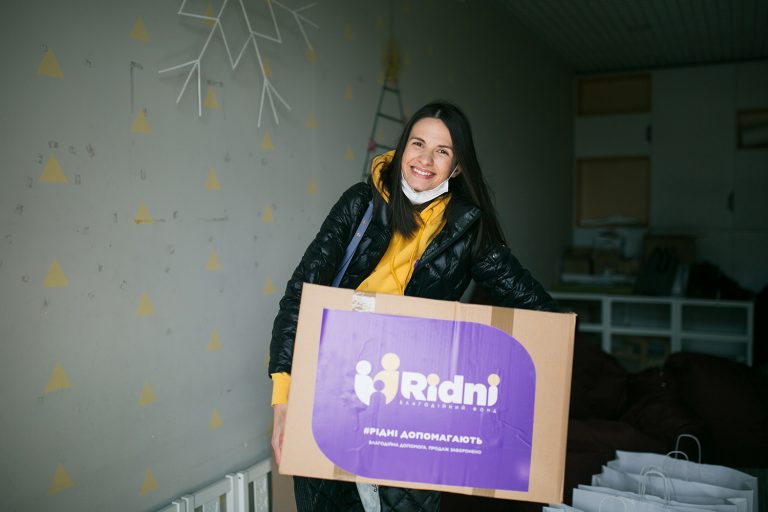
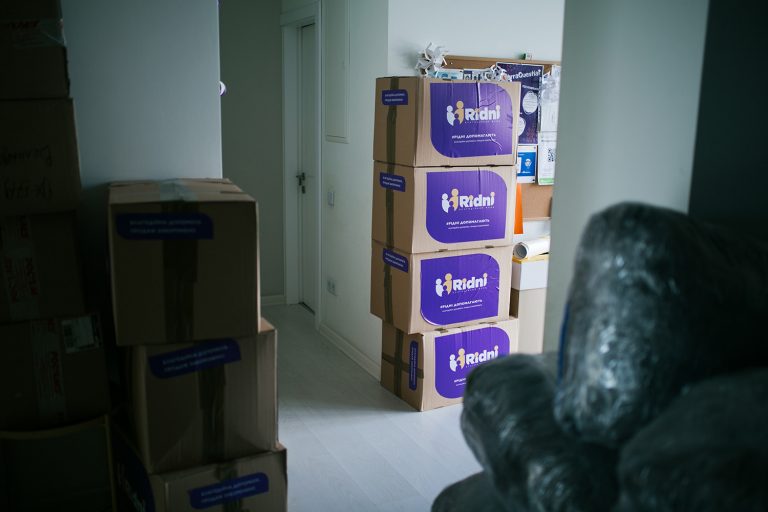
slideshow
Fundraising
RIDNI is a charitable foundation in Lviv that helps abandoned or orphaned children as well as adoptive parents. During the first weeks of the pandemic, the foundation’s volunteers expanded the scope of their work and, together with their partners, purchased 20 ventilators, which were donated to hospitals in Lviv and the region. They also bought 1,800 protective suits for medics, as well as respirators, gloves, and goggles. At the same time, the foundation supports elderly people and low-income families. In the last two weeks, together with the city’s social services, they have received more than 4,000 calls and delivered food to 2,200 families.
The Patients of Ukraine Charitable Foundation have raised more than 9 million UAH (333,900.00 USD), helped more than 100 hospitals across Ukraine and mobilized a large team of volunteers. Also, thanks to their cooperation with the Silpo supermarket chain, 70,000 high-quality protective suits will be donated to Ukrainian medical workers.
Based in Dnipro, KUST is an online magazine that writes about culture., They launched a creative charity project with unique colour-in pages that can be downloaded by making a donation. They invited artists and illustrators from Dnipro and Kyiv to make contour images of their works. Almost fifty drawings were created – famous murals, engravings, and posters, including a design called the “Quantum Leap of Shevchenko” which has gone viral all over the country. You can get these colouring pages by making a contribution on the Dnipro vs COVID-19 page. Ann Zaikina, the editor-in-chief of KUST, recalls,
— While sitting at home during the quarantine, I often felt “out of place.” People are fighting the epidemic, working every day. I wanted to help them, but not just by transferring 500 UAH (18.50 USD), but by doing something more. It reminded me of my colouring book idea, which occurred to me a year and a half ago. Now it turned out to be very timely and grew into a large-scale social project. All funds received are immediately transferred to the Kiddo Charitable Foundation. Its volunteers buy protective suits, antiseptics, respirators and transport them to the general hospitals of the Dnipro region.
Currently, the fund spends 100,000 UAH (3,710.00 USD) a day on medical supplies. “Part of the money was raised thanks to our colouring pages,” says Ann. Each download increases the chances of doctors staying healthy and overcoming the pandemic.
STOP COVID-19.IF and the Ukrainian Charitable Network are associations of active residents of Ivano-Frankivsk who are helping the city’s medical facilities fight the pandemic. Activists raise funds, purchase everything that’s needed and deliver it to hospitals around Ivano-Frankivsk.
#даруйповітря (#giveair) is a joint project of OMG agency and the Ukrainian Charity Exchange. Their goal is to raise 18 million UAH (667,820.00 USD) for 24 ventilators for each region of Ukraine. As part of the initiative, they organize online concerts with the participation of Ukrainian stars, such as Artem Pivovarov, Go-A Band, KOZAK SYSTEM, and Khrystyna Soloviy (one of our Ambassadors, remember? – ed.).
The Lviv Committee of Entrepreneurs organized a public headquarters – “Let’s act together“- which united businessmen in a joint effort to assist the hospitals of the city and the region. While half of the volunteers raise funds and purchase medical equipment, the other sews masks and protective clothing.
RazomGo is a crowdfunding platform from Kyiv whose team launched the #ЩедрийВівторокNOW (GenerousTuesdayNOW) project. Every Tuesday they raise money to purchase personal protective equipment for doctors.
Stantsiya Kharkiv (Kharkiv Station) is an organization of caring people who provide help and support to those who are in difficult life circumstances. Volunteers are currently raising funds for medicine and protective equipment, including the production of face shields for doctors. Another team in Kharkiv, headed by Daryna Petryk, is also raising money for medical equipment and planting flowers near hospitals in their city and region.
In Odesa, Katherine Nozhevnikova partnered with the Monsters Corporation Charitable Foundation to launch the First Aid Volunteer Project. The team raises funds and purchases personal protective equipment as well as tools and disinfectants for hospitals throughout the city and region.
The community and business association of the city of Yaremche initiated a fundraiser to purchase equipment for the local hospital, including a ventilator. In addition, volunteers sew protective gowns and protective shoe covers for local doctors.
Lesya Litvinova is a volunteer, co-founder of the Svoji Charitable Foundation, and chair of the Public Council at the Ministry of Health. During the pandemic, her team continues to care for people with terminal illnesses at home. Some of them have coronavirus. Volunteers also joined the hospital relief movement, and thanks to donors they purchased several ventilators as well as 10,000 biosecurity suits which were distributed to 20 general hospitals.
Nova Ukraine is a non-profit organization with an office in California, USA, which helps strengthen civil society in Ukraine. Their team is engaged in education, fundraising, and organizing events dedicated to Ukraine and Ukrainian culture. According to Ostap Korkuna, one of the founders and co-chair of Nova Ukraine, more than 100,000 USD have been raised and transferred to protect Ukrainian doctors:
— We managed to do it thanks to donors around the world. I am grateful to everyone who supported us, including many Ukrainian stars and public figures. Most importantly, thanks to our volunteers, who, despite all the difficulties of life during quarantine, were able to find time to help Ukraine. Thanks! You are wonderful!

Coordination and support
StopCovidua is a volunteer coordination center helping vulnerable populations. Its team includes about two hundred volunteers who work in translation, design, IT development, psychological support, HR, communications, and a lot more. Their coordinators share, “When the quarantine started, at first it was scary, there was a lack of motivation. However, when we received a lot of positive feedback that our work was beginning to benefit others, we realized that we were heading in the right direction.”
Yak.Today is a site of useful instructions to help Ukrainians as a society fight against COVID-19. It’s run by Garage Hub and contains instructions on manufacturing necessities for Ukrainian medicine — from protective masks and aprons to parts of devices and appliances. The founders assure that all the instructions on their website are tested in practice, designed from materials that anyone can buy at the store, and, most importantly, approved by doctors. “This is a very significant way to help, doctors are currently the most vulnerable group and they always need protection,” says Dmytro, an engineer-inventor.
— The pandemic has become like a litmus test for Ukrainians. People are divided into those who care and those who do not. This pandemic breaks people’s masks and vividly shows those who want to do something positive in society. I think that’s a good thing.
Save FOP Galicia is an organization in Ivano-Frankivsk that is supporting small businesses during the quarantine crisis. The coordinator and founder of the project, Nataliya Serbyn, says that the main task of the initiative is to create “responsible demand”: to buy goods and services from local producers, to spread the word about them, and to help and promote them in the local market. On the project’s page, you can find and order Ukrainian craft cheeses, microgreens, homemade wines, vegetables, pastries, and much more.

Photo provided by BUR (“Building Ukraine Together).
The Krop:hub public space in Kropyvnytskyi was established to support and accompany veterans in their post-war adaptation. Since the beginning of the quarantine, the Krop team has been organizing online meetings with psychologists and coaches. They also hold fundraisers by auctioning off online meetings with local celebrities and public figures. The funds go toward helping doctors.
BUR (“Buduyemo Ukrayinu Razom” – Building Ukraine Together) is a volunteer organization. Their mission is to strengthen active youth and help young people grow as individuals. During the quarantine the team is conducting online camps for children and adolescents, filling their days with various educational activities and training.
supported by
Material prepared with support of United States Agency for International Development (USAID)


